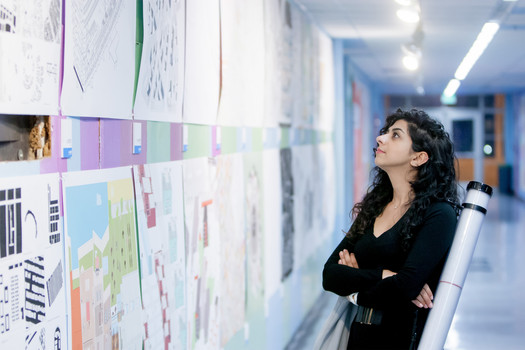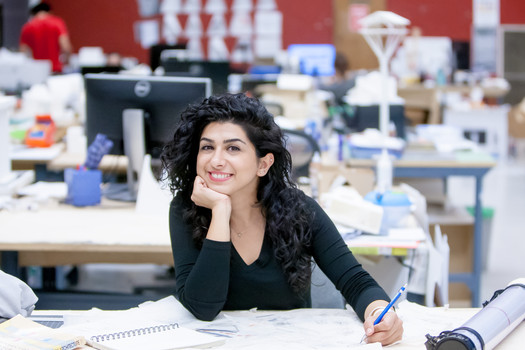Source: www.examiner.com

The year is 2010 and an Iranian architectural student is hunched over a drafting table, adding last minute details to complete an assignment. Recalling the timber frame construction used in traditional cottages, 23-year-old Pegah Roshan is reimagining a similar structural support in a modern design. Most of the other students have left for the day, careful to do so in small groups of 2 and 3 so as not to attract unwanted attention.
Pegah’s classroom is on the second floor of a nondescript building in Tehran and her student experience is similar in many respects to the 15 thousand undergraduates at the nearby University of Tehran, Iran’s premier educational institution. Similar with one important difference: As a member of the Baha’i Faith, she and thousands of other Iranian students who share her particular religious affiliation are legally barred from attending any university in Iran, let alone the University of Tehran. Access denied.
Higher education in Iran is open to all qualified Muslim students as well as those belonging to non-Islamic religions officially recognized by the Islamic government: the Christian, Judaic and Zoroastrian faith traditions. It’s an educational divide that separates students from faith traditions established before the arrival of Muhammad and those religions that came afterward. This includes the Baha’i Faith which dates its inception from mid-19th century Persia (modern-day Iran).
Since the Islamic revolution of 1979, Baha’is have been barred from universities, either as students or even as members of faculty, as part of a centrally-orchestrated campaign aimed at demoralizing members of a religion viewed by the Islamic government as apostates. At roughly 95 percent of the population, Iranians are almost exclusively Shi’ite Muslim. Sunni Muslims account for nearly 5 percent and, at around 350 thousand members, Baha’is constitute the largest non-Muslim religious minority in the country yet still less than one-half of one percent of Iran’s 70 million people. It is religious exclusivity, then, that is depriving Baha’i students of a university education in their own country.
Education is a human right. It is recognized as such in Article 26 of the United Nation’s Universal Declaration of Human Rights to which Iran is a signatory government. As if in response to the encouraging motto of the University of Tehran, “Rest not a moment from learning,” Baha’i academics discharged from their teaching positions wasted no time in organizing classes for Baha’i students in private homes. In 1987, after repeated attempts to persuade the Islamic regime to admit Baha’i students, the Baha’i community in Iran established an alternative university called the Baha’i Institute for Higher Education (BIHE). Muslim instructors also joined in a unified effort to offer quality education to Baha’i students otherwise denied.
Since the very beginning, the Baha’i alternative university has been subject to raids by state police, hence the need for secrecy and clandestine instruction. In 2011, government agents swept through the school confiscating books and computers and rounding up faculty. Although some conventional classroom instruction still takes place and a robust online version offers a thousand courses with an international faculty, the school is officially closed and 7 Baha’i educators are serving time in prison.

From our perspective in the West, it’s difficult to imagine any government aggressively preventing a segment of its own society from having access to higher education. Yet the familiar slogan, “A mind is a terrible thing to waste,” calls to mind our own struggle to overcome prejudice in the U.S. The simple maxim created for the United Negro College Fund more than half a century ago has become part of our modern day sensibility, synonymous with equal opportunity and social justice. But in Iran, such ideas are derisively referred to as Westoxicated; part of the political cant leftover from the Islamic revolution disdaining the poisonous influence of Western democracies.
Iran’s fundamentalist mind-set punishes those who think differently. Journalists, artists and social activists are routinely imprisoned on exaggerated charges of blasphemy against Islam or abetting hostile governments. Baha’is face the same charges plus the loss of any government jobs they might hold or pensions they might be entitled to receive. Injustice reverberates when Baha’i students barred from attending state-run universities cannot get official certification for their BIHE course credits and graduate degrees. Until recently, it was impossible without such state certification to transfer BIHE credits to universities in the West for advanced study or translate degrees into job opportunities abroad.
In response, sympathetic educators in the West have made special efforts to ensure BIHE credits are recognized at universities outside of Iran including Yale, the Harvard Graduate School of Education, USC, Stanford Medical School, UC Berkeley, Columbia and a host of other institutions of higher learning in the US, Canada, the United Kingdom and elsewhere.
Roshan has come a long way from the secret Iranian classroom back in 2010. Today, she’s enrolled in the School of Architecture and Urban Design at UCLA, one of America’s premier research universities. Pegah is the first BIHE graduate ever to be accepted into the Master’s program at the cutting-edge school.
Asked about her educational experience with BIHE, Pegah pauses and then, choosing her words carefully, responds, “I’ve had to work harder than other students to get my degree. I’ve had to make sacrifices. But overcoming all the difficulties in Iran helped me to become an independent problem solver.” Explaining why she chose architecture as her field of study, she says, “Well, I believe in the power of spaces to create social change, and we need change.”
Education is the principal means by which nations prosper. But in the landscape of every society, personal fulfilment and collective transformation are areas that lie beyond mere economic growth. If access to an education is a basic human right, then everyone has a stake in how knowledge is generated, how it’s used and how it is shared with others. Pegah’s university experience has shaped her into the person she is today. Education has changed her and she, in turn, has become an agent of change.
Leave a Reply